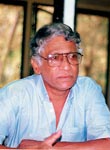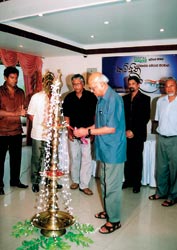
Pathi stirs ‘Kampitha Vila’Acclaimed filmmaker and director of miniplay 'Kadulla' one of the landmark stories in the history of Sri Lankan teledramas, Dharmasena Pathiraja returns to the miniscreen with his latest directorial venture 'Kampitha Vila' (Turbulent Water). Scripted by Tilak Jayaratne and produced by Dunstan Senanayake for 'Digital Fiction', the tele-feature deals with the times and destinies of a multi-ethnic, multi-cultural people in a marginalized village in the eastern coastal belt of the island.
The Batticaloa region right down to Akkaraipattu was the traditional homeland of Tamil and Muslim matrilineal peoples. Way south of Akkaraipattu is the village of Panama, that though non-matrilineal is fully accepting of interethnic marriages, such that it is possible to have a both Sinhala and Tamil personal names among members of same family, such as for example, Mutu Banda and Subramaniam. Panama was originally a part of Uva under the jurisdiction of its Disava (the governor appointed by the king of Kandy). Sometimes it had its own local chief owing direct responsibility to the king of Kandy. The Batticaloa region on the other hand which was under the domination of the Mukkuvars owed allegiance directly to the king of Kandy. That remained so even after that region fell under the nominal sway of the Portuguese and the Dutch. Under the British, Panama and Batticaloa became parts of the Eastern Province and like all of the provinces of Sri Lanka were a British colonial creation. This colonial creation began to have a political significance since then, but older political formations still had some meaning. The people of the village are bilingual; multi cultural, and practise both Buddhism and Hinduism perhaps as a result of inter marriages with bordering Tamil villages. The story unveils with the meeting of Muthu Banda, a labourer attached to the labour gang carrying out excavations around Tissamaharama area under the legendary H.C.P. Bell the eminent Archaeological Commissioner of the Island (1912) with a native Sinhala young woman made pregnant by Bell. Bell, in spite of an English wife and five children had liaisons with local women, some of whose children he fathered. "It was common knowledge that one of the comfortable bullock-carts which accompanied them on his circuits was specially fitted out for the accommodation of his female companion.
'The companion', as in the case of the said young woman were Sinhala and Tamil women from the nearby villages or plantations or from among the many women who worked as wage labour on archaeological sites". This chance meeting triggers off a chain of events that spreads well over a hundred years covering the late colonial period and post-independence era up to the present day. Muthu Banda decides to take her as his spouse. She, however, dies while giving birth to a boy. Muthu Banda takes this child when he reaches the age of five to Panama in the eastern coast, Banda's native village. This boy with Eurasian features is soon forcibly dispatched to a Centre in Calcutta (specially established for children born to Europeans working in India and Ceylon) through the intervention of the British Government Agent of Batticaloa on a request by Bell. The story then symbolically follows the destiny of the Panama villagers in the face of the British colonial ruler's endeavors to take into administrative and economic control of the Central government of isolated and separated villages which until then enjoyed a certain degree of autonomy and independence. Kampitha Vila is played by star cast comprising Roshan Pilapitiya, Palitha Silva, Mahendra Perera, Indika Upamali, Jayani Senanayake, Lakshman Mendis, Lionel Wickrama, Nalin Pradeep Udawela, Padmini Divithurugáma, Maureen Charuni, Chandrasoma Binduhewa, Sarath Kotalawela, Lal Kularathna, Daya Tennakoon, Gihan Fernanado, Sachini Ayendra and Hemasiri Liyanage. |
|| Front
Page | News | Editorial | Columns | Sports | Plus | Financial
Times | International | Mirror | TV
Times | Funday
Times || |
| |
Copyright
2007 Wijeya
Newspapers Ltd.Colombo. Sri Lanka. |

